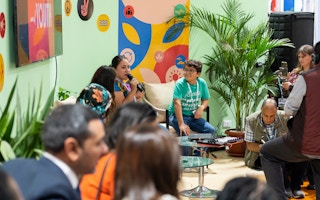As a 28-year-old, I entered my first United Nations Climate Change Conference (COP27) in Sharm El-Sheikh with excitement and a hint of scepticism. I was both exhilarated by the fact that I was attending such a historic event and unsure about the actual impact that came out of these discussions.
To continue reading, subscribe to Eco‑Business.
There's something for everyone. We offer a range of subscription plans.
- Access our stories and receive our Insights Weekly newsletter with the free EB Member plan.
- Unlock unlimited access to our content and archive with EB Circle.
- Publish your content with EB Premium.
On the agenda, I had expected to see conversations between governments, academics and community representatives on the most pressing climate change issues. What I was not expecting was the overwhelming number of pavilions and side events, as well as attendees from multinational companies and lobbyists from the oil and gas industries. It was almost like a business expo featuring the new sustainability solutions companies were offering to the market.
Despite the overt commercial activity, there were moments of inspiration. I was in awe of those advocating for change and pushing for what they believed at the civil society and government levels. I also felt rejuvenated from the discussions with climate advocates – including sustainability experts and youths – and from witnessing the dedication and creativity of the people sharing their work.
For example, former U.S. Vice President Al Gore delivered a rousing and incisive speech at the Climate Justice Pavilion, sharing insights on how an independent, global inventory of greenhouse gas emissions, down to the individual facility, can be used a critical tool to address the climate change crisis.
Some of the loudest voices at COP27 were from those of young people affected by climate change from around the world. They spoke at the street-level protests, as well as at the meetings held at the YOUNGO Pavilion, the official youth constituency of the United Nations Framework Convention on Climate Change (UNFCCC).
They campaigned on issues around adaptation funding and compensation for damage from countries that have been the most responsible for global heating.
Their advocacy spoke to me personally. Growing up in isolated parts of Indonesia – from the islands of Sulawesi to the rainforests to Kalimantan and Sumatra – I have seen first hand how climate change and environmental degradation have affected the most vulnerable communities. My family, who used to be islanders from Pulau Saugi in Southern Sulawesi, had to migrate to cities to escape rising sea levels. Many lost their homes and livelihoods. As such, I was able to connect with the youth at COP27.
In the opening discussion at the YOUNGO pavilion, where conversations revolved around loss and damages, I felt the great urgency to their demands for compensation.
However, my impression of these discussions was that the passionate advocates for vulnerable communities were not actually from the communities, but proxies or representatives from the same country and/or from NGOs working in the country. Thus there is a gap between the abstract discussions at these meetings and the lived realities of the people most affected by climate change.
Most of the attendees appeared to have similar socio-economic backgrounds to mine: materially comfortable, English-speaking, tertiary-educated, and globally mobile. Privileged, in short.
This made me wonder whether the voices of the youths at COP27 include those actually living on the frontlines of climate change. Where were the voices of those who have had their homes destroyed, and lost their families and assets?
Some of the panels were very aware that they needed diversity. However, this mostly feels like lip service, as many of these line-ups at these panels were finalised just days before the actual event in chats and networks built at COP27. I heard of someone receiving a text to be on a panel last minute as more Asian voices were needed on it.
For representation to be truly meaningful, there needed to be perspectives from people in the global south, who live with the day-to-day realities of climate change. They should have a say in how decisions are made for climate change adaptation, mitigation and compensation.
We need to think urgently about how we can engage and include voices from the places that most need to be heard. They need to be brought to the table with more intentional support from the organisers and participants of COP.
Community engagement needs to be planned way ahead of the conference, and not an afterthought. These sessions can be facilitated by partner organisations involved in COP proceedings both at civil society and governmental levels.
During these sharing sessions, underrepresented communities can share their experiences with people who can then transmit these stories at conferences. These individuals can also be taught to tell their stories through photography and writing, and advocate for themselves through these mediums. These powerful materials and insights, which bear witness to their experiences, can also be shared at high-level decision making panels.
Members of vulnerable communities can also be brought to COP to share their firsthand experiences and be involved in the conversations. Translators can be provided to make sure that non-English speakers be heard directly by policy-makers and leaders.
Only by such inclusive action can representation and diversity become truly meaningful concepts and not just empty talk.


















